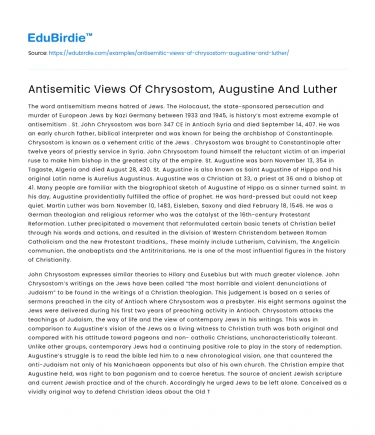The word antisemitism means hatred of Jews. The Holocaust, the state-sponsored persecution and murder of European Jews by Nazi Germany between 1933 and 1945, is history’s most extreme example of antisemitism . St. John Chrysostom was born 347 CE in Antioch Syria and died September 14, 407. He was an early church father, biblical interpreter and was known for being the archbishop of Constantinople. Chrysostom is known as a vehement critic of the Jews . Chrysostom was brought to Constantinople after twelve years of priestly service in Syria. John Chrysostom found himself the reluctant victim of an imperial ruse to make him bishop in the greatest city of the empire. St. Augustine was born November 13, 354 in Tagaste, Algeria and died August 28, 430. St. Augustine is also known as Saint Augustine of Hippo and his original Latin name is Aurelius Augustinus. Augustine was a Christian at 33, a priest at 36 and a bishop at 41. Many people are familiar with the biographical sketch of Augustine of Hippo as a sinner turned saint. In his day, Augustine providentially fulfilled the office of prophet. He was hard-pressed but could not keep quiet. Martin Luther was born November 10, 1483, Eisleben, Saxony and died February 18, 1546. He was a German theologian and religious reformer who was the catalyst of the 16th-century Protestant Reformation. Luther precipitated a movement that reformulated certain basic tenets of Christian belief through his words and actions, and resulted in the division of Western Christendom between Roman Catholicism and the new Protestant traditions,. These mainly include Lutherism, Calvinism, The Angelicin communion, the anabaptists and the Antitrinitarians. He is one of the most influential figures in the history of Christianity.
John Chrysostom expresses similar theories to Hilary and Eusebius but with much greater violence. John Chrysostom’s writings on the Jews have been called “the most horrible and violent denunciations of Judaism” to be found in the writings of a Christian theologian. This judgement is based on a series of sermons preached in the city of Antioch where Chrysostom was a presbyter. His eight sermons against the Jews were delivered during his first two years of preaching activity in Antioch. Chrysostom attacks the teachings of Judaism, the way of life and the view of contempory Jews in his writings. This was in comparison to Augustine’s vision of the Jews as a living witness to Christian truth was both original and compared with his attitude toward pageons and non- catholic Christians, uncharacteristically tolerant. Unlike other groups, contemporary Jews had a continuing positive role to play in the story of redemption. Augustine’s struggle is to read the bible led him to a new chronological vision, one that countered the anti-Judaism not only of his Manichaean opponents but also of his own church. The Christian empire that Augustine held, was right to ban paganism and to coerce heretus. The source of ancient Jewish scripture and current Jewish practice and of the church. Accordingly he urged Jews to be left alone. Conceived as a vividly original way to defend Christian ideas about the Old Testament, Augustine’s theological innovation survived the collapse of the Western Roman Empire, and it was ultimately served to protect Jewish lives against the brutality of the medieval crusades. This is compared to Martin Luther who at the beginning of his career, was apparently sympathetic to Jewish resistance to the catholic church. However, Luther expected Jews to convert to Christianity. When they did not convert, he turned violently against them. In the Post-holocaust world, Luther’s anti-Jewish teachings and their use in the Nazi terror needs to be remembered and examined in raw daylight. It is clear that Luther’s anti- Jewish building blocks of his theology cannot be excused or be kept separate from his much celebrated doctrine of Justification or sacramental theology. Luther had to make up his mind to write no more either about the Jews or against them. He since learned that these miserable and accursed people do not cease to lure the Christians. The Lutheran Church called Missouri Synod holds Martin Luther in high esteem for his bold proclamation and clear articulation of the teachings of scripture. It deeply regrets and deplores statements made by Luther which expresses a negative and hostile attitude towards the Jews. In 1983, the Synod adopted an official resolution addressing these statements of Luther and making clear its own position on anti-Semitism.
Save your time!
We can take care of your essay
- Proper editing and formatting
- Free revision, title page, and bibliography
- Flexible prices and money-back guarantee
John Chrysostom, Saint Augustine and Martin Luther all had their own views on Jews. Some parts of their views were similar to each other while some parts were different. John Chrysostom was extremely anti-Jewish. Johns sermons are only a compendium of many of the themes that emerged in the Christian anti- Jewish phenomenon. they have also had an excessive influence on later attitudes towards the Jews. Chrysostom’s amti-Jewish homiles are marked as a crucial moment in the churches polemics against Judaism, but they seem to have exercised an influence which went far beyond any specific occasion or local situation. Chrysostom’s views are similar to Augustine’s. Augustine is quite similar to Chrysostom although he was a bit more lienent towards the Jews at the start. Augustine and his families believed that the jews must be allowed to survive but never to thrive. Their public misery would broadcast their proper punishments for their refusal to recognize the truth of the church claims.






 Stuck on your essay?
Stuck on your essay?

